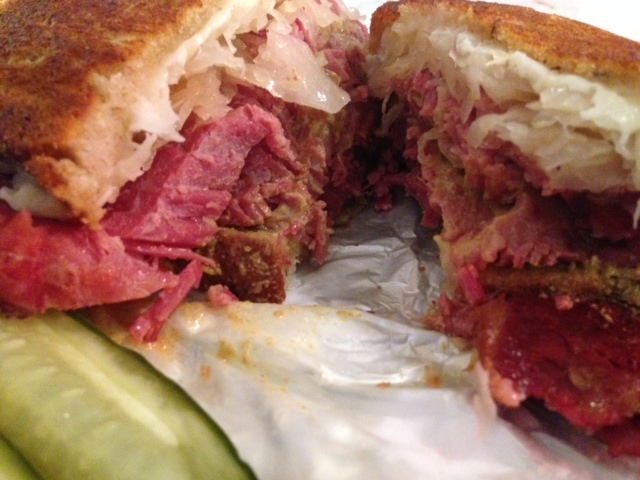Polonez Restaurant
If you missed Polish Fest this year, don’t fret, Polonez Restaurant is open year round! Having moved about 10 years ago from its original site near the Basilica of Saint Josaphat, the restaurant is now tucked away in a mostly residential St. Francis neighborhood at 4016 S. Packard Ave. This area landmark is matched only by a handful of other Polish-American specialty restaurants of similar caliber located elsewhere in the United States.
Visitors know this is a special place when they’re taken pleasantly by surprise upon entering the front door by two life-sized mannequins posed in a glass showcase, richly attired in traditional Polish costumes. Just a few steps from the door, the fully-stocked bar overlooks a well-lit, moderately-sized and modestly decorated dining room where guests indulge in classic Polish dishes – and others – armed with white linen napkins and a sophisticated array of assorted flatware.
![Polonez Platter[1].JPG](https://urbanmilwaukeedial.com/wp-content/uploads/2010/07/Polonez-Platter1.JPG-300x167.jpg) The Polonez menu is replete with components commonly found in Germanic cuisines–large-link sausage, sauerkraut and potato pancakes abound. This is naturally due to Poland’s long, shifting border with Germany and the two nations intermingling cultures.
The Polonez menu is replete with components commonly found in Germanic cuisines–large-link sausage, sauerkraut and potato pancakes abound. This is naturally due to Poland’s long, shifting border with Germany and the two nations intermingling cultures.
But let’s start by noting for those unfamiliar with Polish cuisine, though it may look like German food in many respects, is sweet and mild, clearly in contrast to German cuisine which is characterized by strong elements such as pickled tartness, heavy caraway overtones, black pepper and sharp mustard.
The sauerkraut was quite surprising and not at all the pucker-up flavor that most of us are accustomed to. That, to Mr. M., was a little disappointing because he really likes a pronounced pucker factor to his sauerkraut (Mrs. M. doesn’t care for sauerkraut at all, so the point was moot for her). But that lack of salty-vinegar punch in the sauerkraut and the readily apparent presence of more sweeteners in this food make it stand apart from German cuisine. And that makes it special!
Appetizers offered at Polonez include some unique items ranging in price from $4.50 to $12.50. The six deviled egg halves filled with a Polish-style yolk filling in which finely chopped mushrooms play an important role, and “The Grand Polonaise” which features a cup of herring, two deviled eggs, a croquette of one’s choice (breaded fritters stuffed with either sauerkraut or meat), and three pierogi of one’s choice. Pierogi are large dumplings stuffed with meat, cheese, sauerkraut or mashed potato, and they can be ordered boiled or pan fried. Other Slavic cultures have these in one form or another (Russian and Serbian versions of these filled dumplings are much smaller in size than the Polish ones).
Dinner entrées at Polonez are served with rolls, butter and a cup of the soup du jour or a house salad. The Polish Plate ($17.50) is a sampler platter offering a well rounded experience of Polish favorites, such as pierogi and meat-stuffed cabbage rolls in a sweet, tomato-based sauce. Called “bigos” in Polish (pronounced “bee-gose”), Polish Hunter’s Stew ($14.25) combines lots of mild sauerkraut, pork, beef, and sausage is served with mashed potatoes.
Other Polish favorites range between $10.25 and $16.75, and include pork shanks, stuffed cabbage rolls, grilled Polish sausage (served with a side of bigos), pierogi, Polish-style meatballs (served in one’s choice of tomato or mushroom sauce, with mashed potatoes and choice of vegetable), potato dumplings and a few German/Austrian dishes, such as Wienerschnitzel and Roulade (German sweet-and-sour beef rolls typically stuffed with pickle, bacon, parsley and herbs).
Some American favorites appear on the main dinner menu, like meatloaf and baby-back ribs.
Mrs. M. had an order of the tasty deviled eggs before her succulent, pork-tenderloin cutlets topped with fried, fresh mushrooms. It came served with mashed potatoes, and she ordered the delicate Polish cucumber salad (thinly sliced cucumber in a light cream-dill dressing) to go along with it as her choice of vegetable for $16.75. Two glasses of dry Sauvignon blanc at $6.25 each capped things off nicely for her through dessert.
Mr. M. had to start things off with a cup of Czarnina, a slightly sweet-and-sour soup. Pronounced “char-nee-na,” the name comes from the Polish word meaning “black” because the soup, being made of duck blood, is quite dark in color. The top-secret Polonez recipe contains a few raisins and egg noodles. It was sweet, warm, a little tart and quite delicious! And, because he ordered the Czarnina in place of the soup that normally comes with a dinner entrée, it only cost 50¢ (a cup of it on the side would otherwise cost $3.20).
After his experience with the legendary Czarnina soup (which was featured in a 2009 episode of Bizarre Foods on the Travel Channel when host Andrew Zimmern visited the restaurant), Mr. M. then ordered the Polish sampler platter, with a small side of bigos. A strong Polish beer for $5 was the perfect accompaniment. Needless to say, half of the platter came home for lunch the next day.
Mrs. M. was the only one between us who had any room for dessert, a generous slice of Polish butter-cream torte with coffee and citrus notes running throughout for $5.95. YUM!
The diverse menu is rounded out by a small selection of sandwiches ranging in price from $6.75 to $8, a vegetarian menu which simply highlights the non-meat items available in other sections of the main menu, desserts like Polonez Cheesecake and the heretofore mentioned Polish Torte, priced between $4 and $6.50. Polonez also has a “Lighter Fare” menu featuring, among other things, chicken breasts lightly grilled and served in a red-wine-reduction sauce with fresh, pan seared mushrooms, mashed potatoes and one’s choice of vegetable.
 Of course, you may also sample many fine varieties of Polish vodka here!
Of course, you may also sample many fine varieties of Polish vodka here!
Polonez also has Sunday brunch deals and a classic Friday fish fry. It’s a special place with friendly, attentive service right in our own backyard, so do yourselves a favor and treat yourselves to some genuine Polish cuisine without having to take a trip to similar venues in Chicago or Detroit.
Polonez Restaurant
4016 S. Packard Ave., St. Francis
414-482-0080
Major credit cards accepted.
Dine-in and take-out service available.
Mr. M.’s Bigos (Polish Hunter’s Stew) Recipe
Bigos is the national dish of Poland. A comforting dish any time of the year, it was traditionally reserved for the Polish aristocracy because it’s loaded with lots of different types of customarily expensive meat, from Polish sausage to wild game. There is no single, accepted recipe for this dish – variations are the rule, but our recipe follows as much of a “standard” as there is for this dish. This recipe makes four hearty servings.
4 slices bacon, chopped
½ pound Polish/kielbasa sausage, sliced
½ pound ham, cut into 1/2 “ cubes
1½ cups white/pale sauerkraut, drained (use a sweet, mild variety, if you can find it – see note below)
1 medium white or yellow onion, finely chopped
1 carrot, peeled and finely chopped
1 medium granny smith or other sweet-tart apple, peeled, cored and thinly sliced
1 clove garlic, minced
4 oz. fresh button mushrooms, thinly sliced
1 14.5-oz. can whole, peeled tomatoes, crushed by hand, with their juices
¼ cup dry, red wine, like Cabernet Sauvignon
½ teaspoon salt
¼ teaspoon ground, black pepper
¼ teaspoon caraway seeds (not too much – you don’t want it to taste German!)
2 teaspoons prepared, coarse-grain (spicy) mustard – we like Gulden’s brand, what they serve at Polonez!
1 to 2 tablespoons regular olive oil (for frying the meat and vegetables)
PREPARATION:
In a 4- to 6-quart Dutch oven or other type of large, heavy-bottomed stew pot, fry the bacon until crisp. Use a slotted spoon or fork to remove the bacon from the pot and set it aside (reserve the rendered bacon fat in the pot).
Lightly fry the ham and sausage in the rendered bacon fat until just browned (oh, thank you, Poland!); add in the onion, carrot, apple, garlic and mushrooms and sauté until the onion turns translucent – add a little olive oil if you need to in order to insure everything is coated well with fat.
Stir in the wine and deglaze the pot (scrape up and dissolve any browned bits which might be sticking to the bottom of the pot, if any remain after sautéing the vegetables). Add in the crushed tomatoes and their juices, the salt, pepper, caraway seeds and sauerkraut. Cover the pot and simmer on very low heat (just so the stew bubbles gently) for 45 minutes to an hour (the longer you let it simmer, the better it will be!).
Check for seasoning, then stir the mustard in well. Ladle into serving bowls and sprinkle the reserved bacon on top. Serve with boiled potatoes or boiled egg noodles and crusty bread. Of course, you’ll want to wash this down with cold Polish beer!
Na zdrowie!
NOTE: Try to find a sweet brand of sauerkraut to use for this recipe. We use Frank’s brand sweet Bavarian style with caraway seeds, and we cut the caraway seeds that we add in to only 1/8 of a teaspoon. Also, this recipe freezes well.
Mr. and Mrs. M.
-
Phan’s Garden Is a Vietnamese Favorite
 Apr 30th, 2014 by Jeffrey Merlot
Apr 30th, 2014 by Jeffrey Merlot
-
Brr! Dishcrawl Was Freezing But Delicious
 Feb 13th, 2014 by Jeffrey Merlot
Feb 13th, 2014 by Jeffrey Merlot
-
Jake’s Deli is Deliciously Old School
 Feb 11th, 2014 by Jeffrey Merlot
Feb 11th, 2014 by Jeffrey Merlot






















